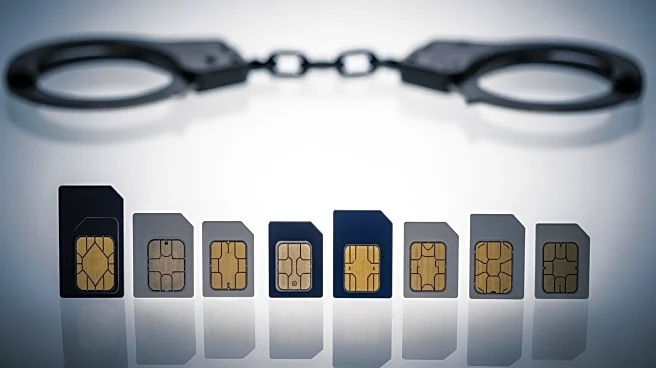What's Happening?
A coordinated law enforcement operation in Europe has led to the arrest of seven individuals involved in a SIM farm operation that supported a cybercrime-as-a-service (CaaS) platform. The suspects provided
a SIM box service that allowed criminals worldwide to use phone numbers registered to other people for various illegal activities, including phishing, smishing, extortion, and investment fraud. The operation, codenamed SIMCartel, resulted in the arrest of five Latvian nationals and two other suspects, along with the seizure of 1,200 SIM box devices and 40,000 active SIM cards. Investigators conducted 26 searches across Austria, Estonia, and Latvia, seizing hundreds of thousands of additional SIM cards and five servers. The operation also targeted two websites promoting illegal services and froze approximately $800,000 in bank and cryptocurrency accounts.
Why It's Important?
The dismantling of the SIM farm operation is significant as it disrupts a major cybercrime network that facilitated over 3,200 fraud cases in Austria and Latvia, causing financial losses of approximately €5 million. The operation highlights the growing threat of cybercrime-as-a-service platforms, which enable criminals to conduct illegal activities anonymously and at scale. By targeting the infrastructure and financial assets of the suspects, law enforcement agencies aim to reduce the impact of such operations on victims and deter future cybercriminal activities. The success of this operation underscores the importance of international cooperation in combating cybercrime.
What's Next?
Further investigations are likely to uncover the full extent of the network's operations and the potential involvement of additional suspects. Law enforcement agencies may continue to target similar cybercrime-as-a-service platforms to prevent the proliferation of such illegal activities. The operation may also lead to increased scrutiny and regulation of SIM card sales and usage to prevent misuse by cybercriminals.
Beyond the Headlines
The operation raises ethical and legal questions about the responsibility of telecommunications companies in preventing the misuse of their services for criminal activities. It also highlights the need for stronger cybersecurity measures and public awareness campaigns to protect individuals and businesses from falling victim to cybercrime.









